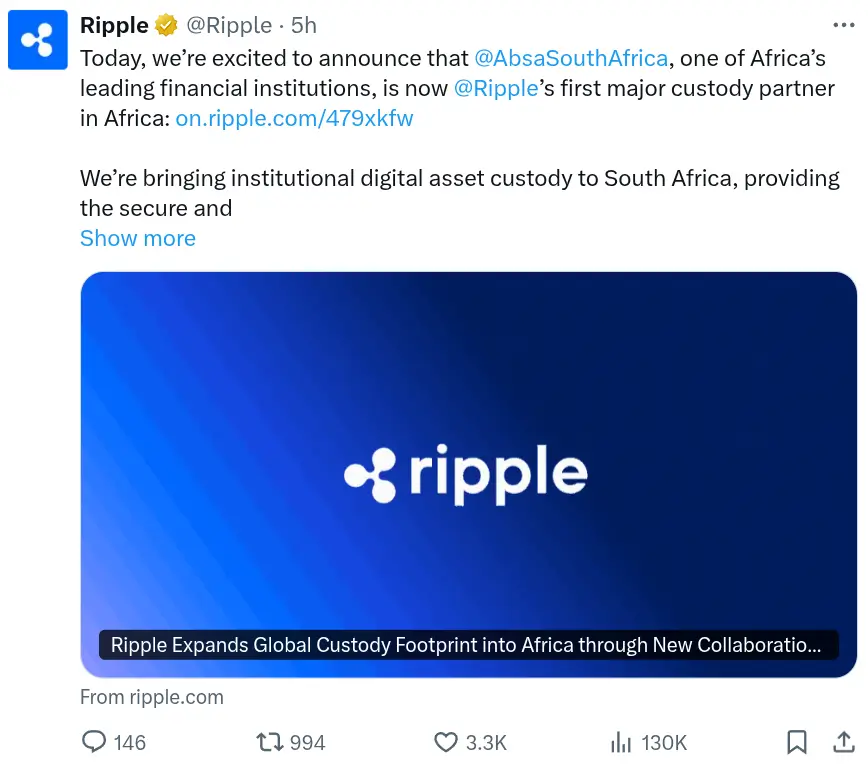
- Ripple partners with Absa Bank to launch Africa’s first digital asset custody service.
- Absa customers gain access to institutional-grade storage for digital and tokenized assets.
- Ripple holds 60+ regulatory licenses, reinforcing trust among global financial institutions.
Ripple has taken another decisive step in its global expansion, joining hands with Absa Bank to introduce digital asset custody services in South Africa. The coalition provides Absa customers with access to institutional-grade storage for tokenized assets and cryptocurrencies, leveraging Ripple’s secure custody platform.
For Ripple, this marks its first major custody agreement in Africa, signaling a clear shift from concept to core banking infrastructure for digital assets. The firm’s custody system, developed following its acquisition of Standard Custody, was designed for financial institutions that must adhere to stringent operational and regulatory standards.
Ripple Joins Hands With Absa Bank to Expand Global Custody Footprint in Africa (Source: X)
It is already being used across several regions, but this marks the first time it has been introduced to Africa’s financial sector.
Absa’s Strategic Leap Into Digital Custody
Absa is one of Africa’s largest and most influential financial institutions, managing 2.07 trillion South African rands ($119.5 billion) in assets. Its decision to integrate Ripple’s technology reflects the pace of change in the continent’s banking system.
“As we continue to innovate and respond to the evolving financial ecosystem, we recognise the importance of providing our customers with secure, compliant, and robust custody solutions for their digital assets,” said Robyn Lawson, Head of Digital Product, Custody at Absa Corporate and Investment Banking.
Absa’s move allows clients to hold, trade, and manage tokenized assets in a regulated environment, without compromising on compliance. It’s a step that could encourage other African banks to incorporate digital infrastructure into their long-term strategies.
Ripple’s Expanding Global Footprint
Ripple’s partnership with Absa builds on a year of major developments for the company. Its custody business has expanded into Europe, the Middle East, Asia-Pacific, and Latin America, creating a network designed for banks, asset managers, and fintech firms.
Ripple has been steadily deepening its presence in Africa. Earlier this year, it joined forces with Chipper Cash to power crypto-enabled cross-border payments and launched its USD-backed stablecoin, RLUSD, through partnerships with VALR and Yellow Card.
The company’s 2025 New Value Report found that 64% of finance leaders in the Middle East and Africa see faster payments and settlements as the strongest motivation for adopting blockchain-based systems.
A Broader Institutional Shift
Ripple’s custody business is growing quickly across global markets. In Spain, it partnered with Banco Bilbao Vizcaya Argentaria (BBVA) to develop tokenized asset custody. In the Gulf, Bahrain Fintech Bay adopted its custody platform alongside the RLUSD stablecoin.
In Asia, Ripple teamed up with BDAas in South Korea to provide institutional custody for XRP, while in 2023, HSBC used Ripple’s platform for tokenized securities. These moves mirror a trend: traditional financial institutions are increasingly blending regulated banking with digital asset management.
Global giants such as BlackRock, Morgan Stanley, and BNY Mellon have also integrated blockchain tools into their operations. Even sovereign wealth funds are taking part. Luxembourg’s state fund has recently allocated 1% of its portfolio to Bitcoin ETFs, while Norway and the Czech Republic have expanded their indirect holdings through equities and pilot programs.
Ripple, with more than 60 regulatory licenses across multiple jurisdictions, sits at the center of this institutional realignment, a connector between established finance and the digital economy.
What This Means for Africa
For Africa, the Ripple–Absa partnership could mark the start of a new financial era. As regulations evolve, digital custody will likely play a crucial role in cross-border transactions, tokenized investments, and modern financial infrastructure.
Ripple brings more than a decade of experience in blockchain innovation, while Absa brings trust, scale, and profound regional influence. Together, they create a model for how banks on the continent can safely transition toward digital finance.




